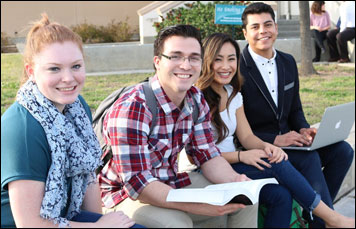Collaboration
Supporting Student Success
 Collaboration between the California Community Colleges, California State University, University of California, K-12, and others has led to a number of successful initiatives that benefit our students.
Collaboration between the California Community Colleges, California State University, University of California, K-12, and others has led to a number of successful initiatives that benefit our students.
These include a common fiber-optic education and research network in California (CENIC CalREN) and eTranscript California, through which more than 100 higher education institutions participate to exchange transcripts electronically.
The CCC Technology Center has played a central role in coordinating these efforts.
A year-long effort between the California Department of Education and the California Community Colleges Chancellor’s Office, with the participation of the CCC Technology Center, led to building an exchange of student identifiers (SSID and CCCID) when students use CCCApply to apply for admission to community college. This effort will assist future research and record matching as student move from high school to community college. Eventually, all matching student records in OpenCCC will contain the SSID K-12 identifier.
In collaboration with the CSU system, CCCApply will pass the CCCID and other relevant student data to the newly rebuilt CSU admission application known as CSU Mentor to facilitate transfer and research. In addition, we are promoting the creation of a common student account to be shared between the CCC and CSU, based on OpenCCC model.
By opening the door to data transfer between the California Department of Education and CCC through exchange of identifiers, we may be able to also exchange high school data that would better facilitate placement of students through the Multiple Measures Placement Service in support of AB 705.
More Information
Communication
 The California Community Colleges Technology Center coordinates with the Chancellor’s Office Communication Division to keep staff and faculty across the system informed about the technology projects funded by the Chancellor’s Office Digital Innovation & Infrastructure (DII) Division.
The California Community Colleges Technology Center coordinates with the Chancellor’s Office Communication Division to keep staff and faculty across the system informed about the technology projects funded by the Chancellor’s Office Digital Innovation & Infrastructure (DII) Division.
The Digital Innovation and Infrastructure Division plays an instrumental role in manifesting the Chancellor’s Office Vision 2030 by helping to ensure the California Community Colleges has access to the technology, research, and data needed to enable students from all backgrounds to succeed in reaching their goals.
Digital Futures Newsletter
The Technology Center collaborates with the Chancellor's Office and Foundation for California Community Colleges to produce the Digital Futures Newsletter. Digital Futures is an effort of the Chancellor’s Office to improve the student user experiences and outcomes through technology initiatives. Led by the DII division, Digital Futures works to support achievement of the student completion and equity goals defined in the Vision 2030.
For more information visit Digital Futures.
Project Management Office
 The California Community Colleges Technology Center Project Management Office (PMO) facilitates processes, communication, reporting, and transparency across the technology projects funded by the Digital Innovation & Infrastructure Division. This promotes fact-based decision making on programs, projects and initiatives, improving overall organizational results.
The California Community Colleges Technology Center Project Management Office (PMO) facilitates processes, communication, reporting, and transparency across the technology projects funded by the Digital Innovation & Infrastructure Division. This promotes fact-based decision making on programs, projects and initiatives, improving overall organizational results.
PMO Services
- Manages processes by which programs and projects are defined, prioritized, budgeted, scheduled, staffed, and executed.
- Facilitates identification of Key Performance Indicators (KPIs) and facilitates processes by which program and project status and health is measured.
- Provides reporting for all projects, programs and initiatives within Technology Center and facilitates fact-based decision making based on project data with stakeholders.
- Provides organizational liaison and central point of contact for all initiatives coming into the Technology Center.
- Develops, produces and distributes Project Management Standards for implementation by statewide technology initiatives.
- Provides education and advice to other systemwide projects and colleges on Project Management Office standards and practices.
PMO Outcomes:
- Improved project quantification, budgeting, tracking, and predictability through introduction of PM best practices.
- Improved team velocity through appropriate planning, removal of roadblocks, and active risk management and mitigation.
- Improved accountability, decision making, and interventions through development, monitoring, and reporting of KPIs.
- Improved cross-organizational collaboration.
- Improved quality of project results
More Information
California Community Colleges Chancellor's Office Information Security, Technology and Innovation
Research, Analysis & Consulting
 College IT departments often operate with limited resources, so the California Community Colleges Technology Center works on their behalf to monitor an extensive list of resources to identify and investigate technology trends that may affect the system.
College IT departments often operate with limited resources, so the California Community Colleges Technology Center works on their behalf to monitor an extensive list of resources to identify and investigate technology trends that may affect the system.
Items identified for review are brought first to the Systemwide Architecture Committee (SAC), then to the Telecommunications and Technology Architecture Committee (TTAC) for review and recommendations.
Recent Examples
- Federated Identity
- Enterprise Portals
- Predictive Analytics
- Data Governance
- Cloud Computing
Systemwide Technology Collaboration
The CCC Technology Center participates in the CCC Directors Collaborative to maintain relationships with other directors and assist with technology issues. In addition the Technology Center’s Executive Director and Chief Technology Officer are called upon to assist systemwide committees.
Working with the SAC, the Technology Center conducts surveys to gather information and identify needs. Recent surveys include a Technology Purchasing Survey that resulted in significant savings opportunities for the system through Foundation for California Community Colleges negotiated pricing, and Information Security Survey which has informed funding of the systemwide security initiatives.
Cloud Computing
Since 2012, the Technology Center at Butte College has deployed all systemwide applications at scale into the cloud, and has established expertise in cloud computing security, DevOps (Development and Operations), zero downtime deployments, and High Availability environments. We apply this knowledge and expertise in a consulting capacity as we assist colleges in moving to a cloud environment.




